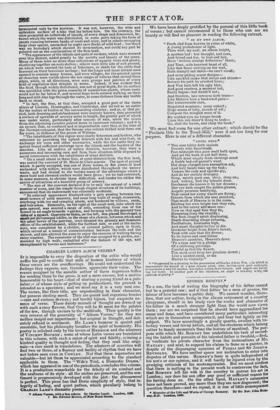CHARLES LAMB'S ALBUM VERSES.*
IT is impossible to envy the disposition of the critic who would suffer his gall to curdle that milk of human kindness of which these verses are the overflowings. He could not understand the feelings they express, nor, therefore, appreciate their value. The reason assigned by the amiable author of these ingenious trifles for sending them to the press, is not a mere excuse, but a motive honourable to his heart—that of starting a young friend as a pub- lisher 0. of whose style of getting up publications, the present is intended as a specimen; and we must say it is a very neat one. The verses, like their title, are unpretending in their character, but possess sterling merit. They are quaint and ingenious fancies —rare and curious devices ; not tawdry bijoux, but exquisite ca- meos of verse. These dainty morsels of thought are dressed up with such a raey flavour, that they will be fit meat for the palates of the few, though caviare to the multitude. Their quality is the very reverse of the generality of " Album Verses," for they are neither insipid nor impertinent ; but original in thought, and deli- cately refined in sentiment. Mr. LABis's humour is quaint and recondite, but his philosophy breathes the spirit of humanity. His poetry is relished only by the lovers of HERRICK and the admirers of VINCENT BOURNE ; some of whose Latin verses are translated in this volume, with such a union of spirit and fidelity, evincing a kindred quality in thought and feeling, that they read like ongi- nals—a rare merit in translations. The admirers of acrostics will find two or three, of a fluency and facility of rhythm that we have not before seen even in COWLEY. Not that these ingenuities are valuable—but let them he appreciated according to the standard applicable to them. The " Wife's Trial, a Domestic Drama," which has appeared in one of the periodicals, concludes this volume. It is a production remarkable for the felicity of its conduct and the neatness of its style : all the unities are preserved, and the sen- timent is progressively developed with the plot: the dinouement is perfect. This piece has that Doric simplicity of style, that in- tegrity of feeling, and quiet pathos, which peculiarly belong to Czaates LA.MB*S dramatic poems:
. enuasYsnes, with a few others. By Oharles Lamb. London, IMO. t Sir, Edward Moxon, of New Bond Street.
We have been deeply gratified by the perusal of this little book of verses ; but cannot recommend it to those who can see no beauty or will find no pleasure in reading the following extract.
" IN MY OWN ALBUM.
" Fresh clad from heaven in robes of white, A young probationer of light, Thou wert, my soul, an album bright, A spotless leaf : but thought, and care, And friend and foe, in foul and fair, Have written strange defeatures' there; And Time, with heaviest hand of all, Like that fierce writing on the wall, Hath stamp'd sad dates—he can't recall;
And error gilding worst designs— Like speckled snake that strays and shines—
Betrays his path by crooked lines ; : And Vice bath left his ugly blot; And good resolves, a moment hot, Fairly begun—but finish'd not ; And fruitless, late remorse doth trace—.
Like Hebrew love a backward pace—
Her irrecoverable race.
Disjointed numbers ; sense unknit ; Huge reams of folly, shreds of wit ; Compose the mingled mass of it.
My scalded eyes no longer brook
Upon this ink-blurr'd thing to look—
Go, shut the leaves, and clasp the book."
We must find room for one other extract; which should be the " Pindaric Ode to the Tread-Mill," were it not too long for our purpose. Here is one of a different character.
"ANGEL HELP.*
" This rare tablet doth include
Poverty with .Sanctitude.
Past midnight this poor maid hath spun, And yet the work is not half done, Which must supply from earnings scant A feeble bed-rid parent's want.
Her sleep-charged eyes exemption ask, And holy hands take up the task; Unseen the rock and spindle ply, And do her earthly drudgery.
Sleep, saintly poor one, sleep, sleep on; And, waking, find thy labours done. Perchance she knows it by her dreams ; Her eye bath caught the golden gleams, Angelic presence testifying, That round her every where are flying; Ostents from which she may presume, That much of Heaven is in the room. Skirting her own bright hair they run, And'to the sunny add more'sun: Now on that aged face they fix, Streaming from the Crucifix ; The flesh-clogg'd spirit disabusing, Death-disarming sleeps infusing, Prelibations, foretastes high, And equal thoughts to live or die. Gardener bright from Eden's bower, Tend with care that lily flower; To its leaves and root infuse Heaven's sunshine, Heaven's dews. 'Tis a type and 'tis a pledge Of a crowning privilege. Careful as that lily flower, This maid must keep her precious dower ; Live a sainted maid, or die Martyr to virginity."
* "Suggested by a drawing in the possession of CharIei Aciers, Esq. ; in which is represented the legend of a poor female saint, who, having spun past midnight, to maintain a bed rid mother, has fallen asleep from fatigue, and angels are finish. ing her wort:. In another part of the chamber, an angel is ten thnj a lily, the embh m of purity:,


























 Previous page
Previous page